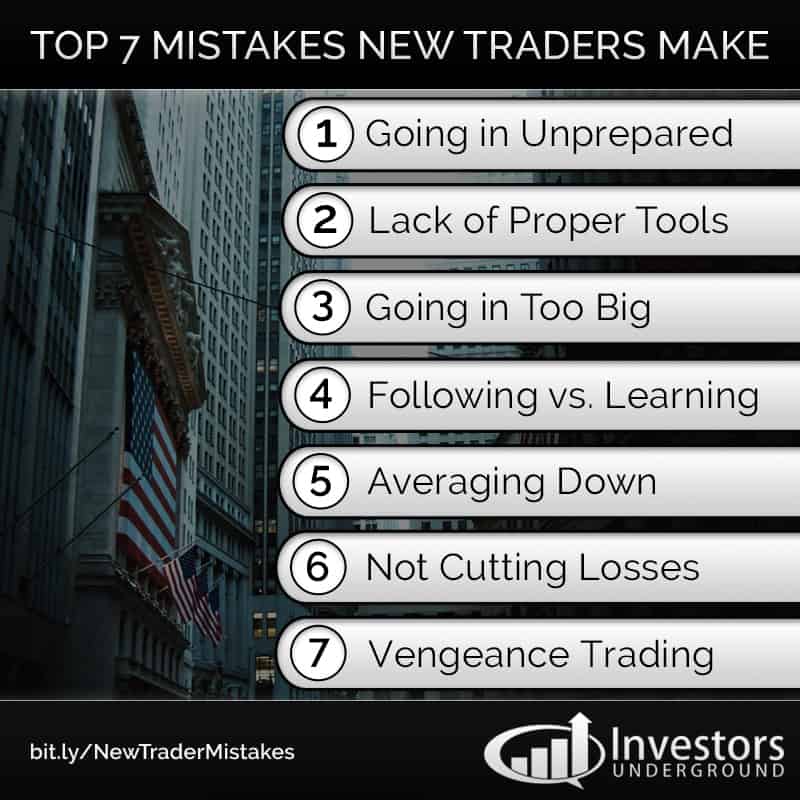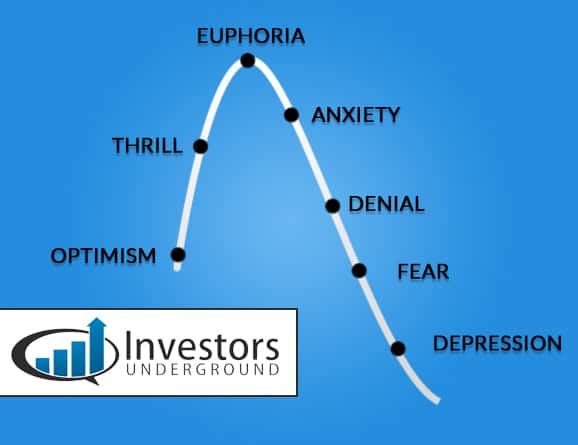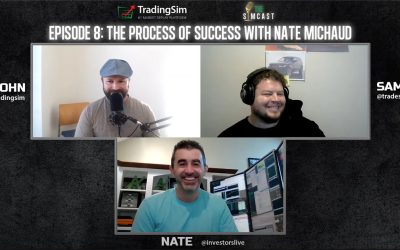Entering the world of stock trading is definitely a very exciting time for many people. Most new traders are allured by the potential to make large sums of money in the stock market. This kind of excitement can be a great motivator for new traders, however, it can also cause them to make some hasty, irrational decisions. When people get distracted by the potential for huge gains, they start treating day trading like a lottery. Trading is not a lottery and stocks are not lottery tickets. You should never bet on a “hot stock pick” or go “all in” on a play. Trading is an art that requires training and discipline. Success is possible, but it is a process not an instant gratification. If you want to become a successful day trader, you need to put in the hours and work for it.
I have been running Investors Underground for a long time now and trading for even longer. I often see new traders repeat the same mistakes. I want to help you avoid making these mistakes so that you can have the best shot at success.
Here are the most common mistakes I see new traders make:
1. Going in Unprepared
As mentioned above, trading stocks should not reflect gambling. You are not going to get rich by luck. Sure, a little bit of luck can be helpful, but you should never depend on it. You need to be prepared for the markets. The first step in preparation is education. You need to educate yourself about trading so that you are properly equipped to master the stock market. You need to know how the market works, what kinds of setups you are looking for and why, and how you will react in a trade.
When we have new traders approach us about getting started with trading, we always recommend our DVD’s first. This isn’t solely because we make money off of them because we could just as easily sell a monthly subscription. We recommend that new traders watch the DVDs so that they can come to the market prepared and confident. Going into the market unprepared is very risky and many traders blow up their accounts due to their hastiness. Don’t get taken out of the game that fast. Prepare yourself so you can have the highest chances of success.
2. Lack of Proper Tools
Trading is an art, and just like any craft, it requires the proper tools and resources. Try building a house without a hammer and nails; it’s not gonna happen. If you want to set yourself up for success in the stock market, you need to make sure you have access to the proper tools. These tools may include brokers, trading software, educational resources, and more. Make sure your toolbox is adequately supplied before you embark on your trading journey. You’d be surprised at how valuable a single tool such as a broker or platform can be. Do your research and make sure you have what you need to properly execute your trading plan.
3. Going in Too Big
You will often see many parallels between new traders and gamblers because the stock market and the casino both have a similar appeal. They offer you the opportunity to turn a small sum of money into a much larger one. Most people know that they have very low odds in the casino, however, not many people realize that they have similar odds in the stock market if they take the wrong approach. We’ve already mentioned the significance of preparation – this is the first step to success in the markets. The next step is proper money management.
Money management is just as important as trading strategy because it helps your protect your capital. It also gives you more cushion for losing trades. If you only use 10% of your capital for any trade, you can never blow up your account from a single trade. 10% is an arbitrary number, but you should get the point. If you go in too big on plays, you expose yourself to unnecessary risk. Even a trader with a 90% win rate stands a chance of blowing up their account if they go all in. You wouldn’t go into a casino and put your life savings on red at the roullette table (hopefully), so why would you take unnecessary risks in your trades? Make sure you are never gambling and focus on managing your money properly. Sure, it’s easy to think about the potential gains, but you can’t forget about the potential losses. It may sting a bit to feel like you could have made more on a trade but it will sting significantly harder if you blow up your trading account and take yourself out of the game.
4. Following vs. Learning
When people get started in trading, they often look for a mentor to learn from. There’s nothing wrong with that. In fact, it’s great to learn from the successes and failures of an experienced trader. The problem comes in when you try to replicate their success through mimicry. That’s the problem with a lot of alerts services. They attract traders who simply want to copy the exact trades of a successful trader. You should be focused on becoming self sufficient. When was the last time you heard someone attribute their success to copying a “guru’s” trades? It just doesn’t work like that.
Learn from others, but don’t follow them.
5. Averaging Down
One of the worst mistakes new traders make is averaging down. This is a great way to turn a small loss into an account-ruiner. We’ve all been there before. You’ve already committed to a trade so now you feel like you have to follow through. “The stock was cheap when I bought it at $5, so $4 is a steal!” This logic is flawed and it will get you into trouble. When you average down, you’re adding to a losing position, thus digging yourself deeper in a hole. You’re better off cutting losses early. No one likes to take losses, but taking a small loss is much better than getting yourself in a position where you can be taken out of the trading game. There will be plenty of other trading opportunities if you preserve your capital. Have a trading plan and stick to it.
6. Not Cutting Losses
Not cutting losses is similar to averaging down. It will hold you back and potentially ruin your account. As mentioned before, no one likes taking losses, but it is an important part of the game. Just consider it the cost of doing business. If you hold onto a loser, you expose yourself to unnecessary risk. That $100 loss can easily go to $200, $400, $1000 and beyond. You need to know how much money you are willing to risk on a play and then follow through with it. It’s important to have a maximum dollar amount that you are willing to risk. If you ever lose more than that, you broke your trading rules. Be smart about cutting losses early and you will have a much stronger chance of succeeding in the markets.
7. Vengeance Trading
There’s nothing worse than trying to make up for a bad trade by placing more trades. “I just lost $500 so now I need to find a $500 trade to make it back.” When you do this, you are trading emotionally and that is a recipe for disaster. You should never trade to make up for losses. You should only trade when you have a prime setup and a solid trading plan. If you start feeling like you are trading emotionally, step back and take a breath. You don’t have to keep trading. This can help prevent you from making a poor trade that you will regret in the long run. Remember, there will always be more opportunities to make money if you preserve your capital. Don’t get too anxious.











Nate….. You are doing a great job. I don´t know how long will it take for most people to begin speculating with you. Maybe a few months from now, maybe a little longer. Some people like me, simply have to wait for a few things to happen before we sign up. What I do know is that most people will begin speculating eventually and that your efforts, your advertising and things you post, like this one, are priceless. Penny Stocking is going to become big in the near future and the kind of work you and Cam and Profit.ly are doing is ground breaking. Congratulations on your insight and the work you do.
Thanks Nate!
Thanks Nate – I needed this! 🙂
I just purchased the DVDs. However, Im awaiting the A.D.D version to be released. Man, there is a lot of information on these DVDs!!
Nate,
Your giving the golden nuggets of wisdom. Thanks
I just quit day trading yesterday for some of the exact same reasons listed above. I am not new to trading but some how have lost my discipline. I have had many days in the last two months where I traded perfectly and made decent profits. I would then be happy, close the platform and walk away. But, something (greed) would always leas me back to “just one more trade”. That one more trade more often than not would result in a loss. I then would begin revenge trading (and breaking many rules due to emotional trading) only to find my profits erased and replaced with big losses. Too many times this has happened over the last 2 months. Trading is my income. Walking away from it for a while is scary and hard on my pride but it is best. I have capital to continue trading but what good is capital when it is being put to use improperly. I will return when I have learned to appreciate the lifestyle trading for a living has given me. As motivation to regain my discipline, I am going to work a “job” and reconfirm my dislike for that way of living. By doing this I will make a little capital but mostly I will be humbled and hopefully return to trading with my old discipline so that I never have to have a “job” again. Follow Nates rules and never ever lose discipline. I could care less about the money I’ve lost. I’m more disappointed in myself and don’t look forward to working.
Wow thanks for sharing. It helps to hear from someone who has been there so hopefully I won’t.
Thanks for your story about your misfortune, I mean this in the most respectful way as this is what I will reflect on when I indulge in the learning of this art.
My philosophy is taken from a quote from Eleanor Roosevelt and that is to “learn from the mistakes of others as life is too short to make them all yourself”.
I am new to this and from the misfortune of others I vow too give myself the greatest of effort that is needed to succeed with this so once again thanks very much as this has shown me that it is very real that this can happen and my current attitude towards this means nothing as I am no exception to the failures of this as is the next person so with all respect thank you for sharing this it means the world to this very green newbie.
Thanks for sharing Ken. I was in the same place as you from January to March of this year. Every day, just about, I would do well then I would lose discipline and get away from the plan. I was kind of breaking even for a couple months then I decided I could have the discipline and upped my positions. I lost a bit from the middle of February to the middle or March then in mid march I lost way too much with an oversize position, All the stuff talked about in the article. It all happened in about an hour. I was disgusted with myself.
My mentor told me to take some time off, but I decided I needed to use the disgust to motivate my discipline. I have signs up in the office etc… to remind me of the feeling. I’ve only broke discipline two times in the last two months and neither was severe (taking trades I really shouldn’t have, but keeping the discipline of my risk management). All that to say, sometimes we just need to recognize what we are doing and get so disgusted with ourselves we come back to doing things the right way.
Exact same thing happened to me last week. I’ve walked away since to regroup. Just utterly disappointed and I can see what Nat is talking about. I will be back and am looking forward to learning from Nat and building my discipline and skills up again.
Nate this is my second month with your service been swing trading for a couple of years and the good thing about swing trading is that I had time to analyze my trades before getting in . This is my second month day trading and was overwhelmed at first trying to follow a bunch of stocks at one time not analyzing and planning my trades I was failing. Started trading one stock at a time may have been one you recommended or may have been one from my scan . I am now able to follow 4 stocks and have a trade plan for each one of them and my brain is focused on those 4 I ignore other alerts . Plan on adding 1 more stock next week and my goal is to follow 6 stock on a daily basis with a trade plan for each. Long story short your service is a great asset as I have learned a lot of trading tips that I didn’t know and learn something on a daily basis keep up the good work and highly recommend your sight.
Dear Dwayne: My name is Roland Sanchez I live on Morgan Hill,Ca. Dwaynne I’m in the same situation like you, my big problem is try to find stocks and be able to get some results, I subscribe in few magazines, but I do not get any luck, you have a very good plan, I make some mistakes, that I try to correct by my self, I’m confuse about trade plan for each stock, and I think this is my mistake, if you have the courtesy of help in this matter I will appreciate very much, my Regards to youu,Dwayne
Hi Roland, I pick my stocks from http://www.finviz.com. It’s on Investors Underground free videos on YouTube. You can choose which exchange you want. Hope it all turns around in your favor😊
Great list of trading mistakes.Keep it up.Good job.
I love the advice you share! I am not in the position to take advantage of your program yet, however, do plan to in the future. Investors Underground has so impressed me. I’m just learning about trading and am focusing on learning patience and due diligence…this is more difficult than I realized. There is so much to learn! Thanks again for sharing this!! Bookmarking it now,
Thanks, Nate
Awesome advice
A few years ago it seemed like I could do no wrong trading stocks
then I made two very big mistakes I had made a lot a money with a stock
that I thought would keep making money for me so I took a very large account size
position in that stock the stock kept very slowly going down but I was to
stubborn to let it go, it dropped about 85 percent
The second big mistake I made was not really researching the stock like I should have.
As I look back on this now it has made me a profitable trader, because I learned from my mistakes
my loss became my gain.
Any more I look at all stocks as trash because they can make large moves up and large moves
down, very quickly with good news, bad news, market chatter and more.
For over a year I have become a swing stock candle stick pattern trader I set up a plus or minus 50 OTC penny stock deals almost every night, I normally don’t hold the stocks for more than three days and cut my losses very quickly. By doing this the account becomes much stronger and very liquid
and keeps me from becoming a bag holder, taking up founds I could be profiting from.
My position size in most cases is about same size and small enough to get in and out quickly and safely, because of so much screen time I can predict what a stock will do most of the time but once
in a while a stock will just jump off a cliff very quickly with no way to make a come back.
But by taking a small position size it doesn’t hurt the overall account size.
Researching new trade ideas has become my passion, and my good friend Google has lead me to some
awesome traders and teachers.
I feel very honored to be here learning from the best of the best
Thank You
Great rules to abide by Nate!!